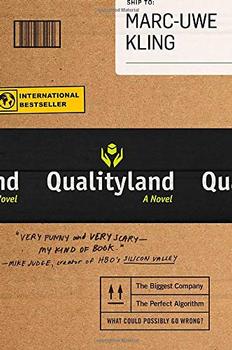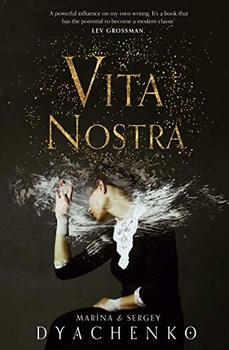Summary | Excerpt | Reviews | Beyond the book | Read-Alikes | Genres & Themes | Author Bio

A Novel
by Nick HarkawayThe basic theme of Angelmaker is familiar enough: a threat to the world must be nullified by an unlikely hero. In Nick Harkaway's hands, however, this simple storyline becomes something entirely unique and unexpected, defying easy classification. It's equal parts science fiction, gangster novel, absurdist comedy, spy story and government conspiracy novel, forming one zany, convoluted, literary three-ring circus where anything can happen. It's the kind of thing you'd expect to get if you dropped Doug Adams's perpetually bewildered Arthur Dent in the middle of a James Bond intrigue: utter mayhem.
It's impossible to read Angelmaker without thinking of Neil Gaiman's Neverwhere (an urban fantasy TV series created by Lenny Henry and Neil Gaiman that Gaimain later developed into a novel). Both delve into the darker aspects of life in England, exploring cultures that exist just below the surface of the mundane world, completely unknown to those of us in the mainstream. I found Angelmaker much darker, edgier and more complex, however, with an underlying sense of menace that pervades the narrative. Angelmaker's plot is also reliant on the mechanical rather than the magical, generating a more convincing and consequently more chilling atmosphere throughout.
The novel does contain plenty of action and it speeds along fairly well, but it's not exactly a page-turner. Harkaway takes his time developing his protagonists, and as a result much of the text is introspective. The characters analyze themselves, the situations in which they've been placed and the role the past has played in leading them to this point.
"[Retired super-spy] Edie Banister is feeling like a cow. More, she is conscious of sin. Not in any fleshy way, alas, but in her heart. She has transgressed against Joshua Joseph Spork. She has, in fact, stitched him up like a kipper, albeit for the good of mankind and the betterment of the human race. She persuaded herself that it was not personal. That this was the best way. Now, gazing at the little toy soldier he repaired so deftly, and recalling the stifled disappointment on his face, she feels wicked. She is increasingly certain that some part of her has borne a grudge for longer than J. Joseph Spork has been alive, and has chosen this method to revenge itself. Duty, love, idealism and spite all discharged at once. She contemplates her soul, and finds it wanting."
While this does slow the book's momentum at times, it has the benefit of creating fully realized characters, something that's essential to the success of this type of novel. When so much of the plot drifts into the absurd, the characters must be believable or the whole thing comes off as silly. Fortunately that's not a problem here; the action takes place in the "real world," and the characters' three-dimensionality nicely balances the unlikely elements of the story.
Extensive characterization can be problematic however, especially when the cast is as large as Harkaway's. I found the way he recycles minor characters throughout the narrative to be particularly troublesome. An individual will appear for two pages early on in the novel, and suddenly return in a larger role, three hundred pages later, with no preamble. Several times I found myself flipping back in the book to reacquaint myself with a character I initially thought was inconsequential. It was confusing at times, and I would think audiobook listeners in particular would find this aspect of Harkaway's writing somewhat aggravating. Overall, though, the plot is so entertaining it's worth tolerating this slight annoyance, plus the surprising ways in which the author uses these supposedly insignificant players is part of the fun.
After reading the first chapter of Angelmaker I asked my reading friends, "How could I have not known about this author?" Harkaway (who is incidentally the son of John le Carré, a fact that, to his credit, is not referenced in his official biography) published his first novel, Gone Away World, in 2008 in the UK (2009 in the USA); Angelmaker is his second novel. I thoroughly enjoyed his dark British humor, complex story, well-defined, likeable characters and wry descriptions, and I found his writing very much up my alley. That said, it's not a book that I would unhesitatingly recommend to everyone. The plot is as intricate as the clockwork device at the book's heart, requiring an attention to detail and level of concentration some may not wish to invest. It's also pretty grim in places, with graphic descriptions of torture and other forms of violence explicit enough that some might find these scenes rather disturbing. Finally, Harkaway's humor is in a similar vein as that of authors Neil Gaiman, Douglas Adams, Terry Pratchett, and Jasper Fforde, which some readers don't quite "get." These attributes are likely to limit the novel's appeal, particularly among younger readers. I would strongly urge those interested in the novel to peruse an excerpt before purchasing it, as I think most will know pretty quickly whether or not it's right for them. I also think that Angelmaker is apt to win Harkaway legions of new fans, as those who enjoy novels of this type – convoluted, quirky, dark yet funny - will likely love every minute of this one.
![]() This review was originally published in The BookBrowse Review in April 2012, and has been updated for the
October 2012 edition.
Click here to go to this issue.
This review was originally published in The BookBrowse Review in April 2012, and has been updated for the
October 2012 edition.
Click here to go to this issue.

If you liked Angelmaker, try these:

by Marc-Uwe Kling
Published 2020
What if the perfect world wasn't built for you?

by Marina and Sergey Dyachenko
Published 2019
The definitive English language translation of the internationally bestselling Russian novel - a brilliant dark fantasy with "the potential to be a modern classic" (Lev Grossman), combining psychological suspense, enchantment, and terror that makes us consider human existence in a fresh and provocative way.
Your guide toexceptional books
BookBrowse seeks out and recommends the best in contemporary fiction and nonfiction—books that not only engage and entertain but also deepen our understanding of ourselves and the world around us.